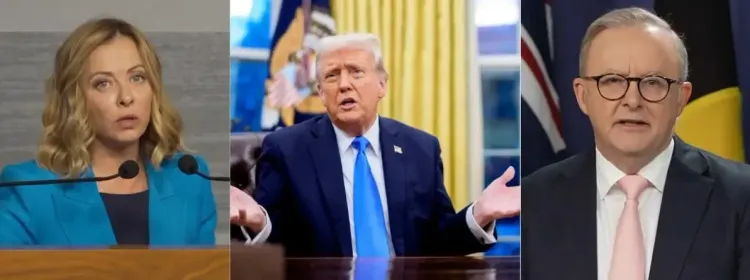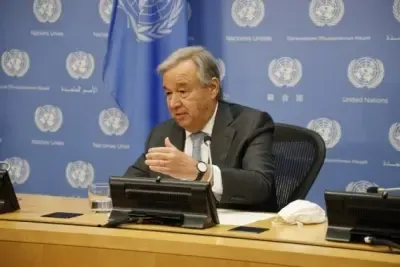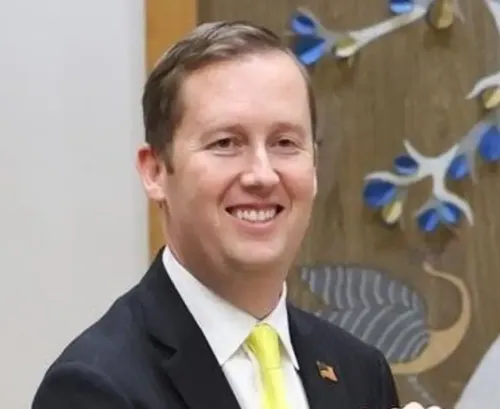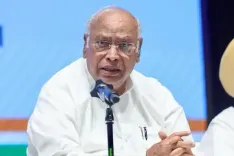Global Leaders Criticize Trump's 'Reciprocal Tariffs' Initiative

Synopsis
Key Takeaways
- Trump's tariffs are viewed as a mistake by many global leaders.
- Brazil condemned the tariffs, citing WTO violations.
- Italy seeks to prevent a trade war with the US.
- Australia plans to use dispute resolution mechanisms.
- Concerns arise over potential impacts on global trade.
Washington, April 3 (NationPress) After US President Donald Trump enacted an executive order regarding the so-called "reciprocal tariffs," global reactions were swift and critical. Many labeled it a "mistake that benefits no one", while others claimed it breaches Washington's commitments to the World Trade Organization (WTO).
In a climate of significant opposition, Trump signed the executive order on Wednesday, introducing a 10-percent "minimum baseline tariff" and elevating rates on specific trading partners, as reported by Xinhua news agency.
The Brazilian government condemned the US for applying an extra 10 percent tariff on all Brazilian exports, stating that this action violates Washington's obligations under the WTO.
According to Brazil's Foreign Ministry, the US had a trade surplus with Brazil of around $7 billion in goods for 2024, and this surplus swelled to $28.6 billion last year when combining goods and services. The ministry noted that "this represents the third-largest trade surplus for the United States worldwide."
The ministry emphasized that the US's unilateral decision to impose a 10 percent tariff on Brazil, claiming it to restore balance and ensure "trade reciprocity," does not accurately reflect the economic reality. They stated, "In defending Brazilian workers and businesses, and in line with its strong commitment to the multilateral trading system, the Brazilian government will consult with domestic industries to protect their interests and seek dialogue with the U.S. government."
While remaining open to dialogue with the US, Brazil is "evaluating all possible courses of action to ensure reciprocity in bilateral trade, including resorting to the WTO, in defence of Brazil's legitimate national interests," as mentioned in their statement.
Additionally, Brazil's Congress swiftly passed a bill permitting the government to impose reciprocal trade and environmental measures against foreign restrictions, just hours after Trump announced the new 10 percent tariff on all Brazilian imports.
The bill, which was approved in the Chamber of Deputies after passing the Senate, awaits presidential ratification. This legislation was fast-tracked with support from a range of lawmakers.
Originally designed in response to unilateral environmental trade rules from the EU, the bill was later expanded in response to escalating trade tensions with the US.
The final version allows the government to respond to any country or economic bloc that imposes trade or environmental measures seen as detrimental to Brazilian exports or global competitiveness across various industries.
Under the new law, Brazil's Foreign Trade Chamber will have the authority to impose countermeasures, such as trade restrictions, suspension of concessions, or review obligations under investment and intellectual property agreements.
However, the legislation stipulates that automatic retaliation is not an option, as it requires diplomatic consultations by the foreign ministry before any formal action.
This shift indicates a firmer stance from Brasilia amidst rising protectionist policies globally, especially from the US, which has escalated tariffs on key imports under the guise of "reciprocal trade."
Italian Prime Minister Giorgia Meloni also criticized Trump's tariffs on the EU, labeling them "a mistake that benefits no one."
Meloni emphasized Italy's commitment to negotiate with the US to avoid a trade war that could weaken Western powers in favor of other global entities.
"We will do everything we can to reach an agreement with the United States to avert a trade war, which would inevitably weaken the West and strengthen other global actors," she asserted.
Should the tariffs be enacted, the EU would face a 20-percent tariff, according to Trump's executive order.
Australian Prime Minister Anthony Albanese denounced the new US tariffs on imports from Australia as "unwarranted" and "not the act of a friend."
Albanese remarked that Trump's announcement of a 10 percent tariff on all imports from Australia was not unexpected but lacked "basis in logic."
He added, "The administration's tariffs have no basis in logic, and they go against the basis of our two nations' partnership."
Albanese confirmed that Australia would refrain from imposing reciprocal tariffs on the US, opting instead to utilize "dispute resolution mechanisms" within the free trade agreement between the two nations.
He warned that the Australian public has every right to view Trump's actions as undermining their free and fair trading relationship, which could have repercussions for how Australians perceive this partnership.
The UK government and various business groups expressed apprehension regarding Trump's announcement of a 10 percent tariff on all British imports, cautioning that it may disrupt bilateral trade and exert pressure on struggling sectors, including manufacturing and small businesses.
Following Trump's announcement, Business and Trade Secretary Jonathan Reynolds stated that the government would persist in negotiations with the US to seek a resolution. "We will always act in the best interests of UK businesses and consumers. Nobody wants a trade war," he remarked.
"There are no winners in a trade war," remarked Rain Newton-Smith, the Chief Executive of the Confederation of British Industry, adding that Trump's announcement is "deeply troubling for businesses and will have significant ramifications around the world."
Scotland's whisky producers expressed their discontent, as the US stands as the largest single export market for Scotch whisky. A spokesperson for the Scotch Whisky Association stated that the industry supports ongoing efforts by the UK government to negotiate a deal, warning that higher tariffs could undermine sales and reduce competitiveness.
The Manufacturers Association of Israel (MAI) expressed concerns on Thursday regarding Trump's decision to impose a 17 percent tariff on Israeli goods, dubbing it a "worrying step for Israeli exporters."
They expressed surprise in a statement, indicating that 99 percent of US goods entering Israel were already tariff-free before this policy change. They cautioned that the new policy could jeopardize Israel's economic stability, deter foreign investment, and weaken the competitive edge of Israeli companies in the US market.
"This worrying step could harm jobs in Israel and reduce activity in the American market," they added.
Canadian Prime Minister Mark Carney stated that Canada will counter US tariffs with its own measures.
"In a crisis, it's important to come together and it's essential to act with purpose and with force," Carney said, noting that Canada's strategic sectors, including pharmaceuticals, lumber, and semiconductors, are under threat from the US.
Drew Dilkens, the mayor of Windsor, Ontario's auto capital, expressed concerns about the potential impact on thousands of jobs. "It could be catastrophic," he stated in a local media interview, "The economic fallout will stretch far beyond Windsor. It would ripple all the way through Ontario. It would ripple all the way through Michigan, Ohio, Indiana and Kentucky."
Referring to Trump as "an arsonist," Canada's New Democratic Party leader Jagmeet Singh commented that the US president is "setting fire to the economy, his own economy, and ours as well."
Meanwhile, Ecuador's primary export industry group warned that the new US tariffs will severely impact its agricultural exports, particularly bananas, shrimp, and cocoa.
The Trump administration's plan to implement a 10 percent tariff on imports from over 180 countries starting April 5 poses a threat to Ecuador's key exports, which currently enter the US tariff-free, according to the Ecuadorian Federation of Exporters (Fedexpor). They noted that the situation is exacerbated by Ecuador's lack of a trade agreement with the US, placing Ecuador at a competitive disadvantage compared to regional exporters with preferential access.
"The absence of a trade deal with the US puts Ecuadorian exports in a weaker position under this new tariff regime," they mentioned in a statement.
Additionally, China has opposed the US reciprocal tariffs, asserting that it will firmly adopt countermeasures to protect its rights and interests.









